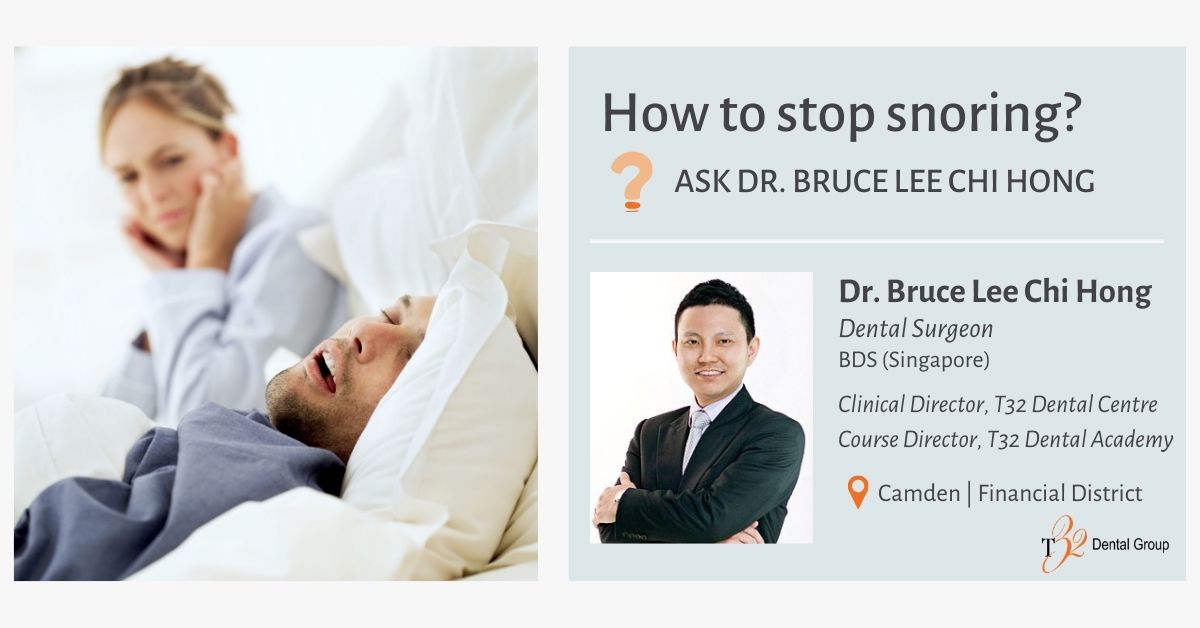
Many people snore occasionally or regularly. While it is usually not something to worry about, for some, it may be a sign of a more serious health condition.
Luckily for us, snoring can be treated. This month, we sat down with T32 clinical director, Dr Bruce Lee Chi Hong, to learn how we can stop snoring for a better night’s sleep.
Why do people snore?
Snoring occurs when the tissues around the throat narrows and vibrates as air flows through it during breathing. This narrowing of the throat is often caused by the relaxing of tissues around the tongue, mouth, throat or nasal passages when a person falls sleep, especially in deep sleep. Blocked or swollen tonsils or nasal passages can also worsen snoring.
Other causes of snoring include:
- Being overweight (wide neck girth (thick neck) resulting in additional weight around the neck tissues)
- Lifestyle causes such as smoking and drinking alcohol
- Sleep posture (especially if you sleep on your back)
Is it healthy to snore?
Mild snoring is not of medical significance to health although it may be annoying to the bed partners. Perhaps investing in good ear plugs or going to bed earlier may help. However, it definitely can become a social problem, creating strain and disharmony in the relationship.
Symptoms some snorers may experience are dry or sore throats in the mornings due to the heaving breathing through the mouth especially. Snoring may worsen with time, as age progresses and and along with health and body conditions.
Moderate to Severe snoring – This can be as loud as a vacuum cleaner (65 to 70 decibels(dB))!
Snorers in this category may suffer from Sleep Disordered Breathing (SDB) where breathing becomes restricted, laboured and even stopped for periods of times during sleep. Obstructive Sleep Apnea (OSA) is one of these conditions which occurs during sleep where breathing stops for more than 10 seconds. This leads to oxygen desaturation and sleep fragmentation.
Commons signs of OSA are:
- Loud snoring
- Excessive daytime sleepiness (eg. Falling asleep during meetings, at the cinema)
- Episodes of stopped breathing during sleep
- Choking or gasping for air during sleep
- Waking up to go to the toilet multiple times at night
- Fatigued and poor concentration during the day
- Irritable and mood changes
- High blood pressure
Are you suffering from sleep apnea? Check if you have these symptoms.
How do I stop snoring at night?
For mild cases, lifestyle changes like exercise and weight-loss, stop smoking and cutting intake of alcohol before bedtime will have alleviate snoring. Sleeping on the side instead of on the back may also be helpful (postural therapy).
For moderate to severe cases, a sleep device worn during sleep will help maintain the airway and thus reducing the vibration of a narrowed airway. This device is custom made by a trained dentist and is titratable (adjustable to achieve needed therapeutic results).
When should I see a doctor about snoring?
ENTs, Sleep Physicians and Dentists are trained to be able to identify potential problems and their causes. Examination by the ENT and a sleep study may be indicated in order to assess the severity of the snoring and its impact on sleep quality and well-being.
ENT and Sleep Physician:
- Management of airway or nasal causes/obstructions.
- CPAP
- Sinus or Nasal surgeries
Dentist:
- Sleep Device (Mandibular Advancement Device)
- Custom made device which can be adjusted to optimal position which reduces snoring levels
About Dr Bruce Lee Chi Hong
Dr Bruce Lee Chi Hong is the Clinical Director and Course Director at the T32 Dental Centre and T32 Dental Academy in Singapore.
Dr Lee has conducted lectures and hands-on training courses both in Singapore and regionally. He serves as Adjunct Lecturer in the Dept of Restorative Dentistry, NUS and has been serving as a Chairman of the Singapore Academy of Oral rehabilitation and Implantology (SAORI) since 2008.
Watch as Dr Lee explains what sleep apnea is to kids.
Consult a Snoring Professional at T32 Dental
At T32 Dental, we can detect and diagnose snoring concern with a thorough examination and a sleep test. By diagnosing the cause of it, we can develop a treatment plan that will be most effective for the patient’s snoring concern.
If you suspect that you have a snoring or sleep apnea problem, contact us for a consultation today.
